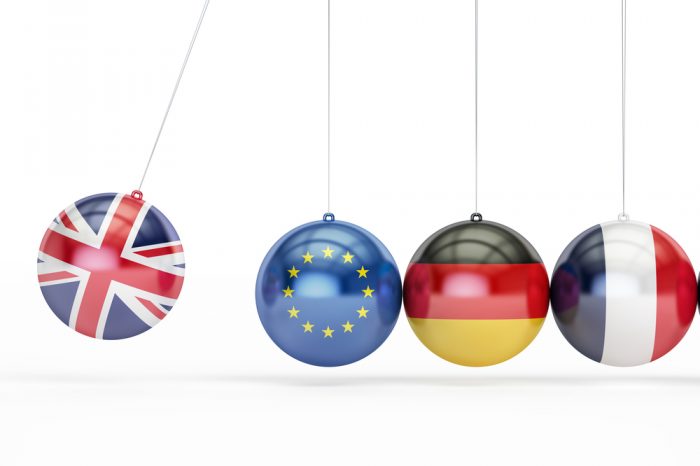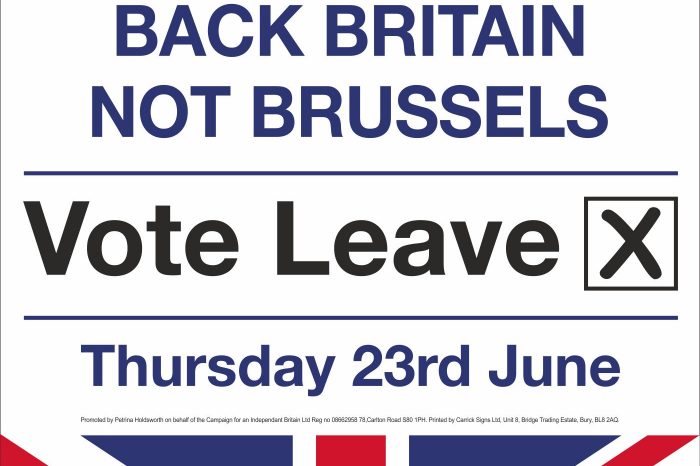The EU’s Anthem – Ode to Joy and enlightened reality?
Why did the ruling élite of the European Union (the EU) plagiarise part of the last movement of Ludwig van Beethoven’s 9th (Choral) Symphony and make it the EU Superstate’s official anthem?
The section in question includes Beethoven’s choral arrangement of Friedrich Schiller’s poem Ode to Joy (original German title An die Freude), hence the anthem’s (unofficial) title. For their trans-national wordless equivalent of the Internationale, the Marseillaise, or Nkosi Sikelel’ iAfrika, they could have used instead extracts from Beethoven’s Wellington’ s Victory which includes Rule Britannia, God Save the King and Marlbrough s’en va-t-en guerre (aka For He’s a Jolly Good Fellow). Instead, however, the EU chose this piece, according to the website, because it ‘expresses the European ideals of freedom, peace and solidarity’. Is this, however, the whole truth or more EU humourous irony?
Delving deeper, the poem Ode to Joy is rooted in the philosophy of the Enlightenment, appealing to the brotherhood of humanity and triumph of the indomitable human spirit. Alas, by the time Beethoven set the poem to music, such sentiments had already turned sour, with the idealism of the Enlightenment giving way to the French Revolution, the Terror and the imperialist tyrannical reign of Napoleon Bonaparte. Schiller, the poet of freedom, became somewhat disillusioned and in later life described his poem to a friend as “detached from reality” and “of value maybe for us two, but not for the world, nor for the art of poetry”. It is also likely that Schiller, out of fear of the authorities, changed its original title from Ode to Freedom (Freude for Freiheit).
Beethoven, taking Viennese society by storm firstly as a virtuoso pianist and then as a freelance composer free from the claustrophobic employment conditions of court or church, infused his music with his personality and a philosophy of life and politics which remained rooted in the hopes of the Enlightenment. He extolled freedom, humanism and an unconquerable human spirit. Despite advancing deafness, he pushed the established boundaries of tonality and invention, blazing a trail for a new generation of composers in the years following.
Beethoven, then, is a role model for what can be achieved when people exert their individuality free from the dead hand of convention and authoritarian rule. This is contrary to everything that the totalitarian régimes in the EU hold dear. Beethoven is hardly a suitable poster-boy for the EU. His free spirit and these hopes for individuality, freedom and the Enlightenment contrast and conflict with the EU’s corporatist inclinations of rule by an unelected and undismissable, élitist, all powerful few in the form of big government, big business and big global organisations.
However, it is possible to observe a token reverence for the ideal of a universal ‘brotherhood’ in some of the actions of the EU and its rulers, such as Angela Merkel and François Hollande, which they are pursing regardless of practicalities and consequences. The desire for “Ever Close Union” is a classic example. Within such idealism there is no recognition of differences in cultures or heritage (and the need to safeguard any aspect of Western Civilisation) or the need for democratic legitimacy, accountability and transparency. This idealism also undermines existing Judeo-Christian traditions, attacking them to the point of destruction.
This idealism is also impervious to the disasters it has largely or completely caused by its dogmatic blindness, such as the Euro (poor economic growth and high unemployment), uncontrolled (unassimilated) mass migration or Greece (unsustainable debts).
Dogged dogmatism never learns from history. It will never appreciate that Continental European philosophy, rooted in humanism, gave rise to Friedrich Nietzsche’s Man and Superman (Also Sprach Zarathustra: Ein Buch für Alle und Keinen) with the superior being, the Übermensch (or Superman), being the final arbitrator of all things. Nietsche argues that there are no absolutes of good or evil and no Christian values of love, compassion, pity and humility – just the values of the strong. This justification of élitism, usually in a debased or mutated form, contributed to the ideologies that caused the terrible genocides of the twentieth century and continue to spread unabated today.
Sadly we will never know, although we can probably guess, what Beethoven or Schiller would have thought of the EU’s attempt at self-aggrandisement, using the extract from the Choral Symphony to further its aim of creating a single, centralised, homogenised and authoritarian tyrannical EU superstate. Given the EU’s élitist sense of entitlement and its increasing control over us individually and our country, would not “Also Sprach Zarathustra” by composer Richard Strauss (inspired by Nietzsche’s work of the same name) have been more appropriate?
However, Beethoven’s only opera, Fidelio, is a dramatic demonstration of higher ideals of freedom (of the ‘little guy’), in the tradition of Schiller:- heroism, justice and marital fidelity versus political tyranny (abuse of power) over which it ultimately triumphed. One scene, leaving the confines of their cells, to breath fresh air, features the Prisoners’ Chorus, which, with a slight modification would be a most appropriate Ode to Freedom for our country:-
Oh what joy, in the open British air
Freely to breathe again!
Up here alone is life!
The EU dungeon is a grave.
Oh Heaven! Salvation! Happiness!
Oh Freedom! Will you be given us?







